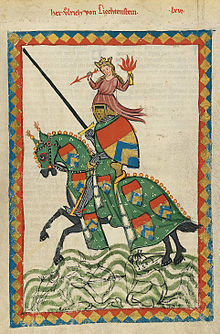Ulrich von Liechtenstein
He wrote poetry in Middle High German and was author of noted works about how knights and nobles may lead more virtuous lives.
There are several instances where he places the (unfree) ministerials and the free nobles in one category separate from the knights to point out the nobility of his own estate.
Much of what scholars know relies heavily upon information gleaned from his often-fictional, self-styled autobiographical work the Frauendienst (trans.
[5] In August 1252 Philip's forces decisively defeated his enemies at the Battle of Sachsenburg on the Drava, and Ulrich was one of seven who mediated the ensuing peace.
[6] Leader of the Styrian nobility, Ulrich had a hand in absorbing the duchy into the possessions of Rudolph of Habsburg after the ducal House of Babenberg had become extinct in 1246.
He writes of himself as a protagonist who does great deeds of honor to married noblewomen, following the conventions of chaste courtly love.
In the second quest, he takes on the role of King Arthur ("Artus"), with his followers becoming Arthurian Round Table characters.
The protagonist, Ulrich, wanders through Styria and Austria in the guise of King Arthur inviting all knights to "break lance" (that is, to joust) three times with him for honor's sake.
